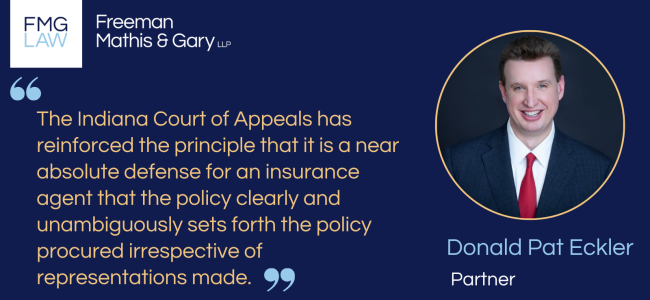BlogLine
Indiana Reaffirms Need for Insured to Read Policy in Win for Insurance Agent
3/29/23

The Indiana Court of Appeals has adopted a rule regarding when the statute of limitations begins to run for claims against an insurance producer similar to that in Illinois announced by the Illinois Supreme Court in American Family Mutual Insurance Co. v. Krop, 2018 IL 122556.
In Morgan v. Dickelman Insurance Agency, Inc., 202 N.E.3d 454 (Ind. Ct. App. 2002), the court held that the plaintiffs’ claims were barred by the statute of limitations on the negligence claim and that the trial court properly granted summary judgment to the defendants on the breach of contract, promissory estoppel, and fraud claims.
The plaintiffs sought recovery from their insurer State Farm and its captive agent from whom they purchased homeowners’ coverage. Damage occurred to the properly of over $700,000 and State Farm paid $330,000, the dwelling limit plus other coverage, and not an additional $150,000 in coverage that the plaintiffs added to the policy several years before the damage.
Relying on Filip v. Block, 879 N.E.2d 1076 (2008) and Groce v. American Family Mutual Insurance Co., 5 N.E.3d 1154 (2014), the court held that the two-year statute of limitations set forth in IC 34-11-2-4 began to run no later than the first policy renewal that did not reflect the increased coverage in 2013. The court held that the error by the agent in not adding the additional coverage was known to the plaintiffs had they read the declaration pages on the several renewals from the time of the additional coverage to the time of the loss. Given that the issue was easily identified, the insured was charged with knowledge of the amount of coverage actually provided by the policy.
As to the breach of contract claim, the court rejected the plaintiffs’ argument that there was an oral agreement to increase the coverage, holding that State Farm paid the policy limit for the dwelling listed on the policy and the policy never reflected an increased premium for the additional requested coverage. The court found that there was no question of fact despite the plaintiffs’ submitting an affidavit that contradicted the defendant that the request had been made, relying on the 2 Couch on Insurance § 29:42.
On the promissory estoppel claim, the court finding that no exception to the requirement that the insured is to read their policy applied where no special hazard was agreed to by insured and the language of the amount of coverage to be provided is clear and unambiguous and quoted from the defendants’ brief which stated “if the exception to the duty to read were extended to dollar amounts on the first page of a renewal certificate, an insured would have no duty to read any document.”
The court similarly disposed of the plaintiffs’ fraud claim finding that the renewal certificates were simple to read and had they reviewed them they would have known that reliance on the representation of the agent of increased coverage was not reasonable.
The Indiana Court of Appeals has reinforced the principle that it is a near absolute defense for an insurance agent that the policy clearly and unambiguously sets forth the policy procured irrespective of representations made.
For more information, please contact Donald Patrick Eckler at patrick.eckler@fmglaw.com, or your local FMG attorney.
Share
Save Print
